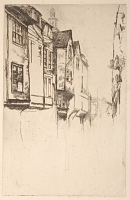Wych Street, London | ||
| Number: | 176 | |
| Date: | 1877 | |
| Medium: | etching | |
| Size: | 216 x 139 mm | |
| Signed: | no | |
| Inscribed: | no | |
| Set/Publication: | no | |
| No. of States: | 2 | |
| Known impressions: | 12 | |
| Catalogues: | K.159; M.156; W.132 | |
| Impressions taken from this plate (12) | ||
KEYWORD
building, church, city, half-timbered, lantern, street.
TITLE
The site, Wych Street, is named in all variations on the title, as in the following examples:
'Wych Street, London' (1877, Whistler). 3
'Wych Street No. 1' or ' Wych Street No. 2' (1877, Whistler). 4
'Old Houses (Wych St., London)' (1881, Union League Club). 5
'Wych Street' (1887/1888, Whistler). 6
'Wych Street' (1886, Frederick Wedmore (1844-1921)).
7
'Wych Street. - Strand' (1903/1935, possibly Rosalind Birnie Philip (1873-1958)). 8
'Wych Street' (1909, Howard Mansfield (1849-1938); 1910, Edward Guthrie Kennedy (1849-1932)). 9
Since Whistler's first title 'Wych Street, London' clarifies the location, it has been accepted, rather than the shorter version 'Wych Street' used by later cataloguers. 'Wych Street No. 1' and 'No. 2' probably indicate states rather than different etchings.
'Wych Street, London' (1877, Whistler). 3
'Wych Street No. 1' or ' Wych Street No. 2' (1877, Whistler). 4
'Old Houses (Wych St., London)' (1881, Union League Club). 5
'Wych Street' (1887/1888, Whistler). 6
'Wych Street' (1886, Frederick Wedmore (1844-1921)).
7
'Wych Street. - Strand' (1903/1935, possibly Rosalind Birnie Philip (1873-1958)). 8
'Wych Street' (1909, Howard Mansfield (1849-1938); 1910, Edward Guthrie Kennedy (1849-1932)). 9
Since Whistler's first title 'Wych Street, London' clarifies the location, it has been accepted, rather than the shorter version 'Wych Street' used by later cataloguers. 'Wych Street No. 1' and 'No. 2' probably indicate states rather than different etchings.
4: 14-16 November [1877], GUW #13668.
5: New York 1881 (cat. no. 142).
6: List, [August 1887/1888], GUW #13233.
7: Wedmore 1886 A (cat. no. 132).
8: Envelope containing copper plate, University of Glasgow.
9: Mansfield 1909 (cat. no. 156).
DESCRIPTION
A street of three- and four-storey houses, with overhanging upper floors, and small-paned windows, recedes into the distance towards the right. The lantern of a church projects above the roofs at right.
SITE
Wych Street, the Strand, London, England. The site, with its old timbered houses, was considered picturesque by other artists. For instance, a view of Wych Street by Henry Reeve was exhibited at the 4th 'Black
and White' show at the Dudley Gallery in 1876 (cat. no. 293). 10
10: The Glasgow Herald, 12 June 1876.
The 'Society for Photographing Relics of Old London' was established in 1874 to record threatened buildings and sites. On 6 July 1877 the Times reported the Society's publication of Old London, the first of a series of albums of photographs, and asked the public to 'give intimation ... of the intended demolition of interesting buildings ... in good time.' 11 The Society's first published set of twelve photographs included two views of Old Houses in Wych Street (Nos. 7-8) and Old Houses in Drury Lane. The second set included Temple Bar (No. 19), taken from almost exactly the same position as Whistler's etching (the correct way round, whereas the print is of course reversed).
11: 'Archaeology and photography', The Times, London, 6 July 1877, p. 4.
In 1896, Thomas Robert Way (1861-1913) published a set of lithographs, Reliques of Old London, including views of Wych Street, Drury Lane, the church of St Bartholomew the Great, and Cloth Fair, which had been etched or drawn by Whistler in the late 1870s and 1880s. 12
12: Smale 1987, p. 22.
DISCUSSION
It is not clear whether Whistler was interested in such sites as 'quaint' or 'picturesque' survivals of older times, or was interested in preserving threatened sites. He seems to have been inspired or influenced by the photographs published by the 'Society for Photographing Relics of Old London.' His etching was a record of an area that was threatened with development. As such it is one of several prints documenting a vanishing London.


